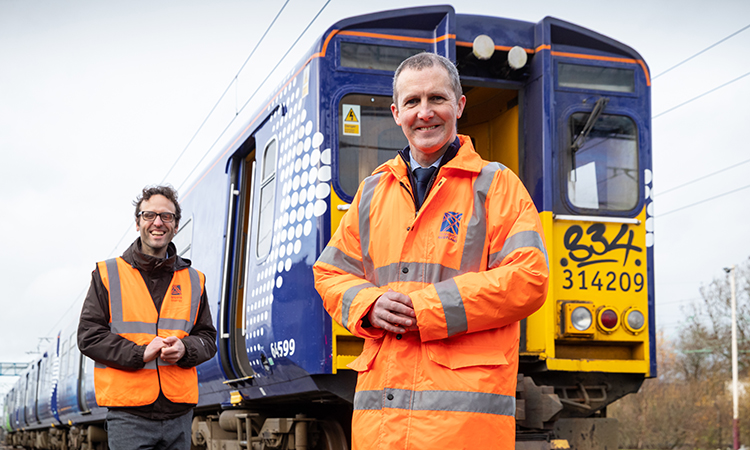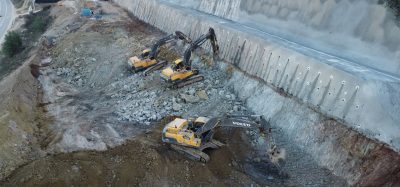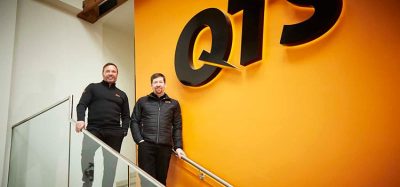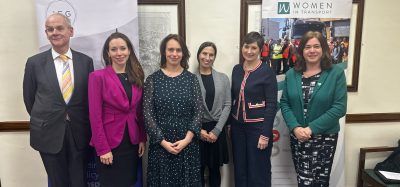Arcola Energy to lead consortium for delivery of Scotland’s first hydrogen-powered train
Posted: 5 January 2021 | Global Railway Review | No comments yet
By working on the development of Scotland’s first hydrogen train, Arcola Energy and the consortium will support the country’s target to achieve net zero emissions by 2035.


Credit: Arcola Energy - Pictured: Scotland’s Transport Secretary, Michael Matheson, with Dr. Ben Todd and a 314 Class electric train.
Scottish Enterprise, Transport Scotland and the Hydrogen Accelerator – which is based at the University of St Andrews – have appointed Arcola Energy and a consortium of industry-leaders in hydrogen fuel cell integration, rail engineering and functional safety to deliver Scotland’s first hydrogen-powered train. A key objective of the project is to create opportunities for the Scottish rail supply chain through skills development and the industrialisation of the technology.
The consortium will be led by hydrogen fuel cell integration specialist, Arcola Energy, and draw on the expertise of world-leading rail engineering and safety experts to deliver full system design and integration based on Arcola’s A-Drive technology platform. The project is supported by rail engineering and safety experts, Arup and Abbott Risk Consulting, to form an integrated delivery team, with AEGIS providing regulatory third-party verification.
“Hydrogen traction power offers a safe, reliable and zero carbon alternative for Scotland’s rail network. The hydrogen train project is an excellent opportunity for industry leaders in hydrogen, rail engineering and safety to collaborate with Scottish technology providers to develop a deployment ready solution,” said Dr Ben Todd, CEO of Arcola Energy. “We are delighted to be working with Scottish Enterprise, Transport Scotland and the Hydrogen Accelerator to support Scotland’s strategy to make passenger railways emission free by 2035.”
Arcola Energy will develop the technology platform for the train’s new powertrain from its planned new Scottish base. Arcola’s existing A-Drive platform will be extended to meet rail safety and compliance requirements, thereby enabling the consortium to significantly reduce development time and cost to deliver a complete hydrogen powered solution in just 10 months.
The consortium includes:
- Arcola Energy will be the project lead responsible for hydrogen fuel cell system engineering, design and integration and project demonstration
- Global engineering consultancy, Arup, will provide specialist rail engineering expertise for technical concepts, high-level design and safety strategy. Arup’s Edinburgh office will also work with the Hydrogen Accelerator to chart the route to the mainline deployment of hydrogen powered trains across Scotland
- Abbott Risk Consulting, based in Edinburgh and Glasgow, will deliver specialist product development compliance and health and safety management
- AEGIS Certification Services will provide third party safety certification and compliance verification.
Project partner Arup will use the learnings from the project to develop a roadmap to roll out hydrogen trains to support the decarbonisation of Scotland’s network.
“With Scotland’s focus on achieving net zero emissions by 2035 and rail playing a leading role in this, hydrogen offers a safe, reliable and zero carbon alternative to other forms of rail propulsion,” said Clare Lavelle, Scotland Energy Business Lead at Arup. “This project is not only a crucial step in helping us to understand the practical challenges of using hydrogen traction power on our railways, but an example of the type of investment that Scotland needs to take advantage of the opportunity to build a secure, flexible, cost effective and zero carbon energy network.”
Edinburgh-based risk and safety management consultancy, Abbott Risk Consulting (ARC), will bring functional safety, product development compliance and health and safety management expertise to the consortium.
John Abbott, Managing Director of ARC, added: “This is a really important project for us and for Scotland. We are already engaged in hydrogen fuel-cell trials for aviation. To be part of this consortium and to be able to apply our functional safety experience to such an important sustainability initiative for Scotland’s railways is a real privilege.”
AEGIS Certification Services brings in-depth knowledge of UK rail industry certification and approvals processes. AEGIS will provide third party safety assessment and compliance verification to deliver Scotland’s first hydrogen powered train and associated infrastructure.
“AEGIS Certification Services is delighted to have been selected to team up with Arcola Energy and partners for this prestigious project that will help to enable the Scottish government’s objective of phasing out diesel-only trains by 2035,” said Mark McCool, Managing Director of AEGIS. “With our growing portfolio of railway decarbonisation projects, AEGIS looks forward to working with industry leaders in hydrogen technology to assure the safe integration of hydrogen fuel cells into passenger rolling stock, enabling the rail industry to further develop this technology towards a carbon neutral rail network.”
Based at the Bo’ness and Kinneil Railway, the consortium will convert a Class 314 car passenger train, made available by ScotRail, into a deployment-ready and certified platform for hydrogen powered train development.
Following demonstrations, the train will serve as a development platform for Scottish technology providers and academics as Scottish Enterprise and the Hydrogen Accelerator explore opportunities for Scotland’s hydrogen-enabled low carbon strategy.
The Bo’ness and Kinneil Railway will provide engineering facilities and support for testing and public demonstrations.
Scotland’s Transport Secretary, Michael Matheson, added: “This project has the potential to be a game changer for the future of Scotland’s rail rolling stock. Our Rail Decarbonisation Action Plan sets out to make our passenger railways emissions-free by 2035, but, to maximise our climate change ambitions, there is also a requirement to look at what we do with retired stock. If we can bring those back into use in a carbon neutral way, there are huge climate gains to be made.”
The consortium will demonstrate the hydrogen powered train during COP26, hosted by Glasgow City, from 1 November to 12 November 2021.
Related topics
Hydrogen Trains, Sustainability/Decarbonisation, The Workforce
Related organisations
Abbott Risk Consulting (ARC), AEGIS Certification Services, Arcola Energy, Arup, Bo’ness and Kinneil Railway, Hydrogen Accelerator, ScotRail, Scottish Enterprise, Scottish Government, Transport Scotland, University of St Andrews
Related regions
Related people
Clare Lavelle, Dr Ben Todd, John Abbott, Mark McCool, Michael Matheson






